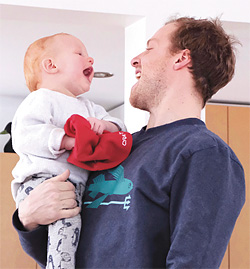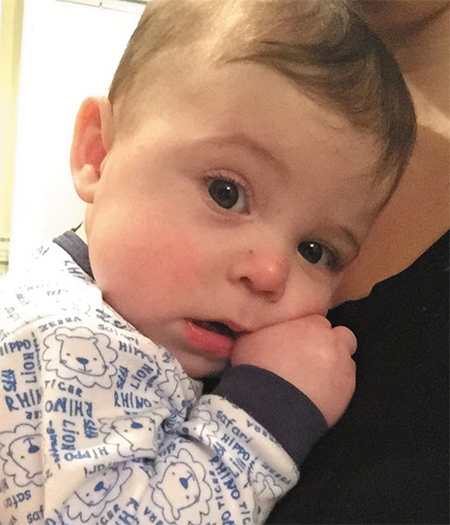The parent-child relationship
From birth, your baby is trying to connect with you. Her five senses (hearing, eyesight, touch, taste, and smell) enable her to perceive the world around her. For example, she likes to hear your voice and look at your face (see Talking with your baby).
Your baby expresses her needs with signals like crying and moving her arms or legs. For example, her crying may mean she’s hungry or uncomfortable (see Crying). She calms down when you hold her and attend to her needs.
When you feed, bathe, or talk to your child gently while looking at her, you’re building your relationship with her. Little by little, you're discovering the enjoyment of being together.
Your baby develops through her relationship with you and the others who care for her. For example, she learns to self-soothe and communicate.
Attachment
When you respond to your child’s needs consistently and with nurturing care, a trusting relationship develops between you. This bond is also known as attachment.
Take the time to observe your baby and get to know her. For example, try to tell the difference between when she is hungry or tired. You will learn to understand her better through trial and error. When you try to meet her needs, she’ll see that you’re there for her and that she can count on you. She’ll develop a feeling of trust and safety with you.
![]() A newborn mostly expresses her needs by crying (see Crying). You won’t risk spoiling her by comforting her promptly. That helps her feel confident and secure.
A newborn mostly expresses her needs by crying (see Crying). You won’t risk spoiling her by comforting her promptly. That helps her feel confident and secure.
Newborns do not have the ability to wait for their needs to be met. Starting at 4 months, she gradually becomes able to wait a few seconds, then a few minute. If you’re unable to respond to your baby’s need promptly, you can try to distract her. Continue talking to her or offer her a toy: “Mommy’s on the toilet right now. I’ll look after you soon.” When she’s older, she will understand better what you are saying to her.
If your child feels confident and safe with you, she will also feel more confident exploring the world around her. She will know he can go back to you when she needs to. Encourage her to explore at her own pace, in line with her abilities. She needs to explore her environment to develop.
Separation anxiety
From 8 or 9 months onwards, your child may have difficulty being separated from you. This is called separation anxiety. This anxiety is normal: your baby feels safe when you’re there and she wants to stay with you. This reaction will gradually fade until around 18 months, when she will have experienced a number of positive reunions with you.
When you leave, reassure your baby and say you’ll be coming back, even if she doesn’t understand well yet. It is best to leave without drawing out your goodbye. Your child may react when you leave. That doesn’t mean you should go back to her. The important thing is that she feels that you are confident and that you’re not worried about leaving her with someone else. While you’re away, you can leave your child with a piece of clothing or blanket with your scent.
When you arrange for a babysitter, you can spend some time with your child and the babysitter. This gives your child time to get used to the babysitter and see that you trust that person.
Communication
Your baby started hearing you talk before she was even born. From her earliest days, she’s interested in your voice and loves the varied and playful changes it makes when you talk to her. She also observes your face and guesses your emotions. She understands words months before she’s able to say them.
At first, your baby expresses herself through crying, mimicking, gesturing, moving her arms and legs, grimacing, and making sounds. Start by observing her to try to understand her. To respond, talk to her. Give her time to react to your words, then speak to her again. Communication is like a tennis game where each person takes turns hitting the ball back and forth. It’s important that your child has a place in the exchange, whether she expresses herself by crying, or with sounds or words.

![]() It’s best to be at the same height as your baby when you talk to her. It’s easier for her to look at you when you’re face to face.
It’s best to be at the same height as your baby when you talk to her. It’s easier for her to look at you when you’re face to face.
Photo: Nicole April
Making communication easier
To help your child communicate with you, you can:
- Position yourself at her height, facing her, so she can look at and listen to you.
- Get her attention and avoid getting distracted yourself, whenever possible.
- Encourage her often with a gentle word, a smile, etc.
When talking to your child, you can:
- Name the things that attract her attention (e.g., “Ah! That’s the light,” “Oh! That’s a dog”).
- Describe what you’re doing and what she’s doing (e.g., “I’m going to give you some milk,” “You’re taking your bath”).
- Name how she’s feeling, even if she doesn’t understand yet (e.g., “You’re angry about waiting. You’re hungry”).
- Repeat often to help her learn.
It’s recommended that you use the correct words (e.g., “cow” instead of “moo-moo”), because those are the words she will use later on.
First words
Your child will gradually transition from making sounds to using words. Each child progresses at her own pace. It’s important not to put pressure on her, for example by asking her to say a word. Rather, celebrate her effort and be interested in what she is communicating, no matter how she’s doing it. Encourage her attempts to communicate, whether it’s by pointing, making sounds, or saying words.
It’s normal that you and those around you don’t always understand what your child says. She’s not yet able to pronounce words like an adult. You can try to guess what she means and name it. Say the word again correctly, but don’t ask her to repeat it. Your child will improve over time.
If you have any questions or concerns about your child’s language development, don’t hesitate to see a healthcare professional.



